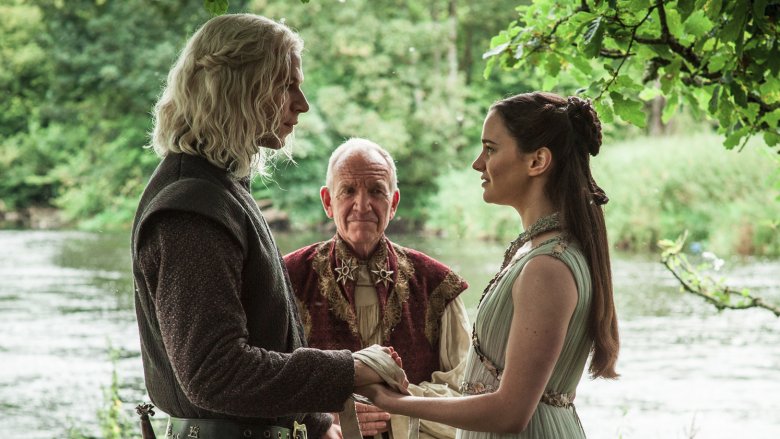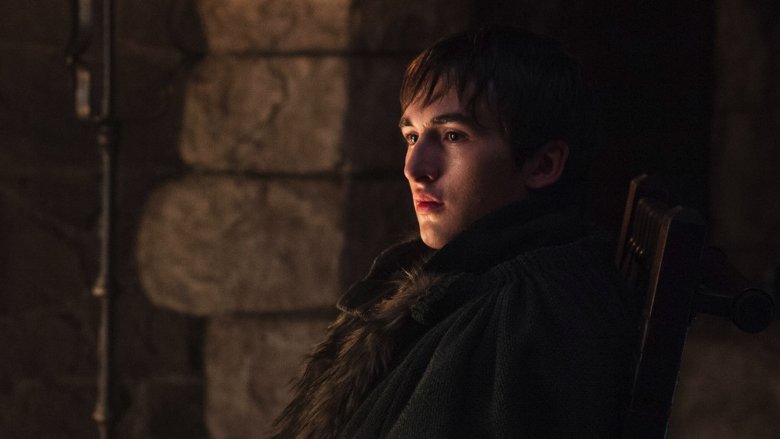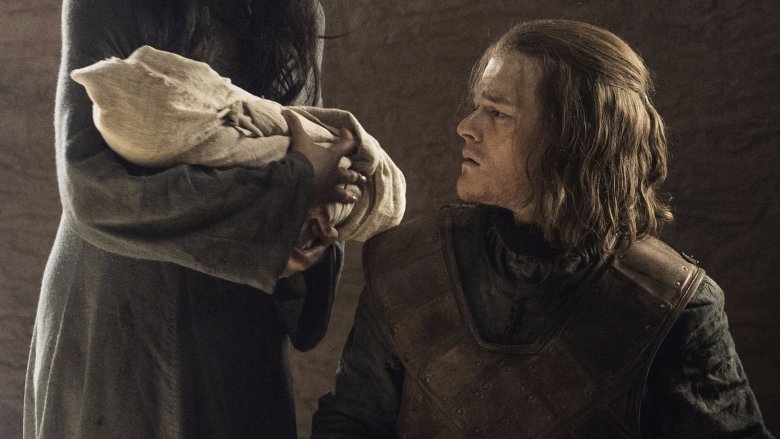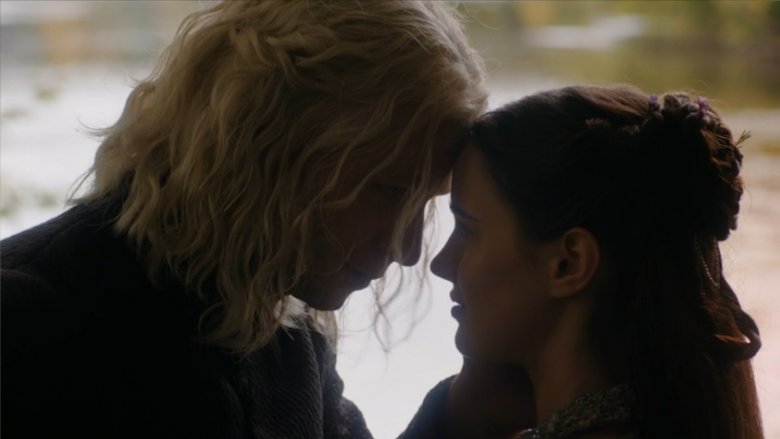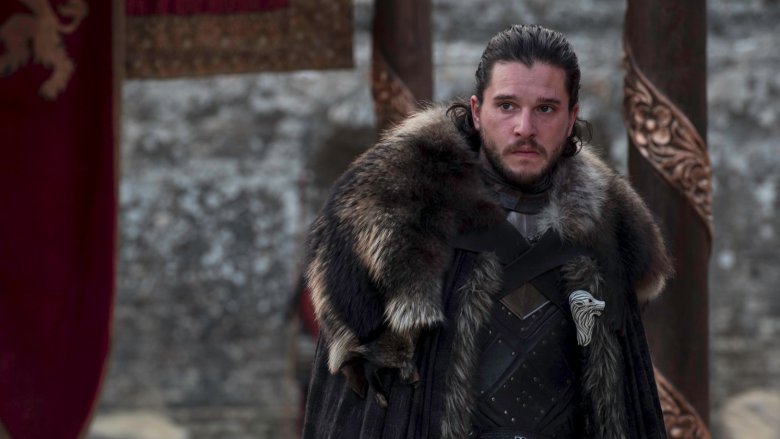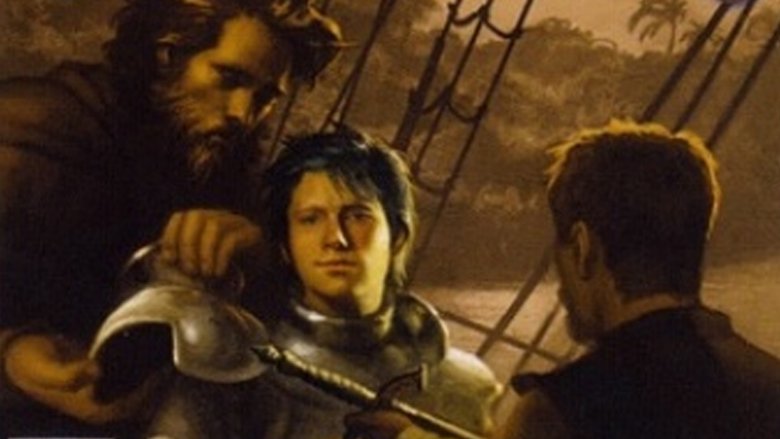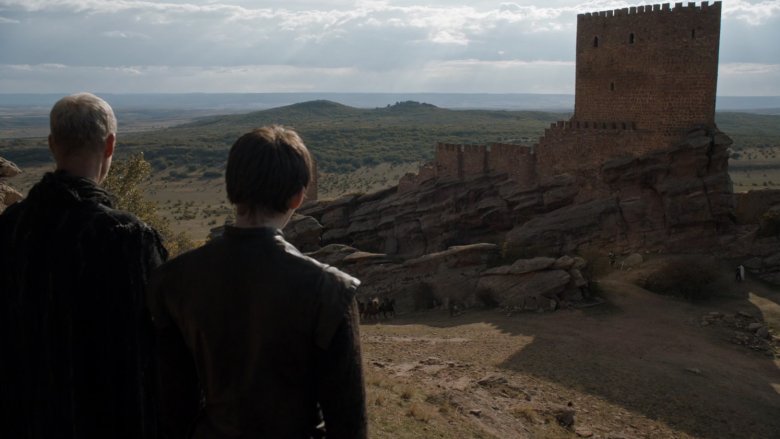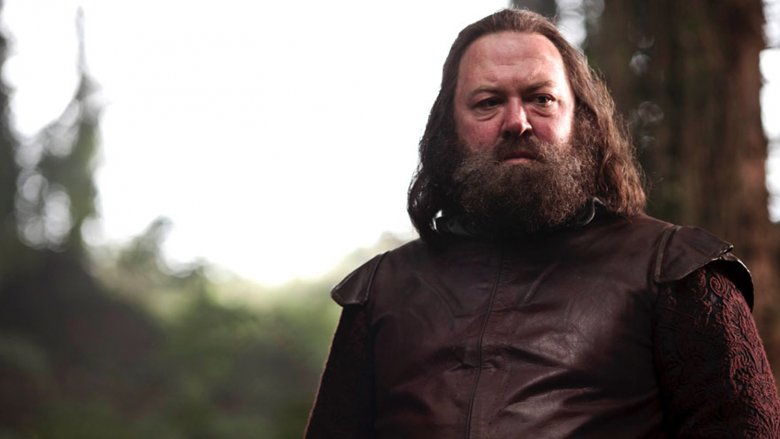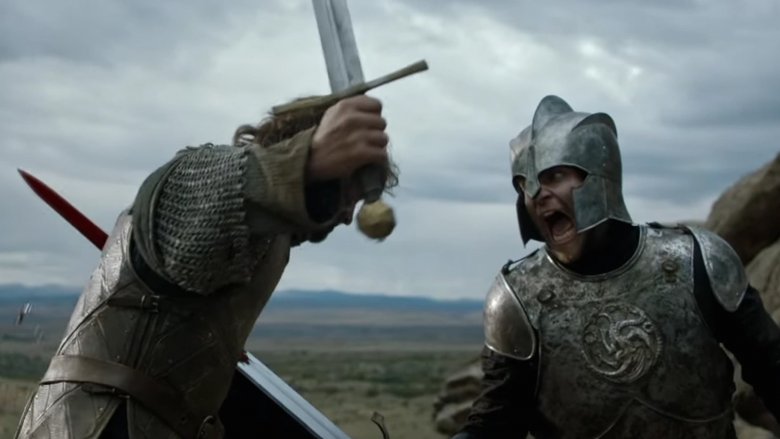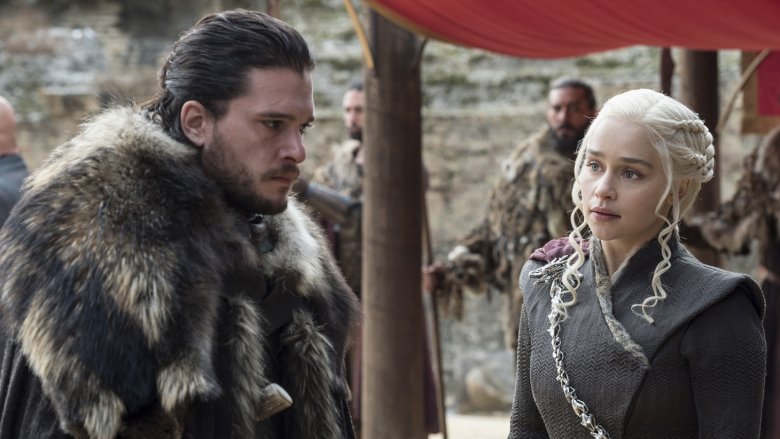What Jon Snow's Name Really Means
During the Game of Thrones season seven finale, viewers' worlds were turned upside down when—spoilers ahead—Bran and Sam finally confirmed that Jon Snow isn't a bastard—and he isn't really named Jon Snow. We learned that not only was Jon the child of Rhaegar Targaryen and Lyanna Stark, but that his parents were married, making him a trueborn son and the legitimate heir to the Iron Throne. What's more, his name is really Aegon Targaryen. This revelation could change the course of Jon's life, so let's take a deep dive into the history behind his true name—and what it might mean for the future of Westeros in the eighth and final season of Game of Thrones.
Bran was wrong
In the scene between Bran and Sam Tarly during the season seven finale, Bran tells Sam that Jon's bastard name should really be Sand, not Snow. Even though it was a moot point (since Jon's parents were actually married), Bran was actually wrong about this. Yes, Dornish bastards are named Sand. But it's not where a bastard was born that determines the name—it has more to do with where the child is raised and/or the mother's homeland. For example, the Three-Eyed Raven was a bastard of Aegon IV "The Unworthy," and was born in King's Landing, but his mother was a Blackwood of the Riverlands, so his name was Brynden Rivers. Even if Jon had been a bastard, he likely still would have been a "Snow" given that his mother was a Stark of the North and he was raised there.
More importantly, this scene revealed that despite his new powers, Bran isn't omniscient. While the error about a bastard's correct surname is understandable, it's important to note that he didn't know about Rhaegar and Lyanna's wedding until Sam told him. While he was able to call up the event immediately in his visions, the fact he didn't think to look into this until prompted by Sam is evidence that Bran still has a lot to learn about his new role as the Three-Eyed Raven—and that he still needs help from time to time. Hopefully we'll see Sam step into that role in season eight. With his near-encyclopedic knowledge of history, Sam may be able to prompt Bran to see the truth behind some important past events, like the Long Night.
Annulment in Westeros
As we learned earlier in the season, the High Septon annulled the wedding of Rhaegar and Elia Martell before marrying Rhaegar and Lyanna, which means Jon was really the trueborn son of Rhaegar and Lyanna, making him a Targaryen. George R.R. Martin largely based a lot of Westeros on England, particularly the Wars of the Roses in the mid-to-late 1400s. Marriage annulments in England during this era offer up a lot of interesting information that may likely apply to the practice in Westeros as well.
An annulment (in historical/middle ages terms, at least) isn't a divorce—it's as if the marriage never happened in the first place. Historically, getting an annulment granted was a difficult prospect, but it could be done. If High Septon Maynard was corrupt, it may have just taken a bribe. There are also a few historically valid annulment reasons that could've applied in the case of Rhaegar and Elia. Rhaegar could have argued that they were too closely related, because of the marriages of King Dareon II and his sister Daenerys Targaryen to Princess Mariah Martell and her brother Prince Maron a hundred years before. Alternatively, he could have used Elia's ill health and inability to bear more children as a reason to set her aside.
Regardless of the reason, the effects of annulment on Elia and her children were enormous. When a medieval marriage was annulled, any children of that union were declared illegitimate. This actually happened to Queen Elizabeth I and Mary I ("Bloody Mary") when they were young, because Henry VIII had them both declared illegitimate after annulling his marriage with Catherine of Aragon and later beheading Anne Boleyn. He eventually returned both of these daughters to the order of succession, but they remained illegitimate.
Rhaegar's obsession
According to the books, Rhaegar was obsessed from a young age with the prophecy of the Prince That Was Promised. At first he thought it was himself, born in the aftermath of the Tragedy at Summerhall. Then he believed that it was his son with Elia, telling Elia that "his is the song of ice and fire." Rhaegar also communicated that belief to Maester Aemon on the Wall via raven. But Rhaegar also told Elia that there must be "one more," something that was impossible for Elia to fulfill.
He may have eventually realized the importance of "ice and fire" to the prophecy, perhaps reading some hidden sign or omen in the events that occurred at the Tourney of Harrenhal. This is where he met Lyanna Stark for the first time, and named her the Queen of Love and Beauty after he won the tournament. It's been theorized that he may have fallen in love with Lyanna after she allegedly took part in the tournament as a mystery knight in order to defend the honor of Stark bannerman Howland Reed, who had been attacked by three squires.
It seems to have been not long after the tournament that Elia was sent back to Dragonstone with her children, and Rhaegar disappeared with Lyanna, along with two of the Kingsguard: Ser Oswell Whent and Ser Arthur Dayne.
What's in a name?
Following the birth of their son, Elia Martell asked her husband what he wanted to name him. Rhaegar replied, "Aegon. What better name for a king?" At that point, Rhaegar thought this boy would be the Prince that Was Promised and eventually the King of Westeros. He chose the name Aegon, which has obvious historical significance in the family. Rhaegar's great-grandfather was Aegon V, aka "Egg" from the Dunk and Egg tales. He was considered a good king, one who bestowed many rights to the smallfolk, to the consternation of his lords. It was Egg's obsession with dragons (an obsession that worried his brother, Maester Aemon) that caused the tragedy at Summerhall, where Aegon and many others died in a fire. Rhaegar was born at Summerhall the same day, and it was said that the Tragedy at Summerhall hung over him "like a sense of doom" for the rest of his life.
And we can't forget Aegon the Conqueror, who forged the Seven Kingdoms with fire and blood, along with his sisters Rhaenys and Visenya and their three dragons. Later there was Aegon II, who fought in the civil war called the "Dance of the Dragons" against his half-sister Rhaenyra. The son of Rhaenyra, Aegon III, healed the nation in the war's wake. Finally, there was Aegon IV, "the Unworthy"—an infamous king who legitimized all of his bastards (including the Three-Eyed Raven) on his deathbed, setting off the many Blackfyre rebellions that followed.
The other Aegon
Wait a minute—wasn't Rhaegar's son with Elia Martell named Aegon? Why would Rhaegar give both of his sons the same first name? The answer lies in Rhaegar's obsession with prophecy. When Rhaegar realized he was wrong (again) about the prophecy of the Prince that Was Promised, he essentially discarded his former wife and children. He now believed that the child Lyanna was carrying was going to be the fulfillment of that prophecy and the eventual King of Westeros. "Aegon. What better name for a king?" It doesn't matter that his now-bastardized son with Elia was named Aegon. Rhaegar wanted the Prince That Was Promised to be named Aegon, and so that was the name he told Lyanna to give their child.
To complicate matters further, the "other" Aegon (son of Elia) may still be alive in the books. Allegedly, Lord Varys had the infant son of Elia switched with a peasant baby before the sack of King's Landing (where Gregor Clegane killed Elia and her children), shipping Aegon off to be raised in Essos under the alias "Young Griff," cared for by Rhaegar's friend Jon Connington. Although this claim is rather dubious, this alleged Aegon has now raised an army (the Golden Company, no less) and returned to Westeros to claim the Iron Throne in direct competition with Daenerys, who is still somewhere in Essos.
Obviously, the showrunners decided to abandon this complicated "fake Aegon" plot for the series. That being said, the revelation of Jon's true parentage—and his legitimate claim to the Iron Throne—may be explored in the final season as a potential source of conflict between Jon and Daenerys.
The Tower of Joy
One major implication of Jon being a true Targaryen echoes resoundingly on the events at the Tower of Joy. Lyanna and Rhaegar disappeared (along with two of the Kingsguard) not long after the Tournament at Harrenhal. They went to Dorne, where they were married and took up residence in the Tower of Joy. It seems that they stayed together there for the better part of a year, during which time Lyanna became pregnant and Robert's Rebellion kicked off. Ser Oswell Whent and Ser Arthur Dayne also remained there throughout the duration of the war, protecting their prince, and later, his wife and unborn son.
At some point during the war, the Lord Commander of the Kingsguard, Ser Gerold Hightower, was dispatched by King Aerys to retrieve Rhaegar. Given that Hightower knew where to find them, it's very possible that Aerys was aware of Rhaegar's new marriage, and may even have approved. It's said that he disliked Elia Martell, and refused to hold the Princess Rhaenys when she was born, saying she "smelled Dornish." Rhaegar left the Tower of Joy to take control of the crown's armies, and went on to die at the Battle of the Trident in single combat with Robert Baratheon. Instead of returning to King's Landing with Rhaegar, Gerold Hightower stayed with Ser Oswell and Ser Arthur at the Tower of Joy, giving Lyanna and the unborn heir three Kingsguard protectors.
Built on a lie
As Bran mentioned in his vision, Robert's Rebellion was built on a lie. Rhaegar didn't kidnap Lyanna Stark, which was what Ned's older brother Brandon assumed. On its own, her disappearance may not have started a war—but Brandon went to King's Landing to challenge Rhaegar, and King Aerys had him arrested for treason. Lord Rickard Stark also went to King's Landing to answer Aerys' summons, where Aerys murdered Rickard and Brandon. Next, the Mad King demanded that Lord Jon Arryn execute his wards Ned Stark and Robert Baratheon. The Lord of the Eyrie refused, and raised his banners in revolt. Because of his relation to the Targaryens through his grandmother, Robert Baratheon became the titular leader of the rebellion. That is what Ned meant when he told Robert in season one, "you had the better claim."
We still don't know exactly why Lyanna and Rhaegar didn't just tell her family they had eloped. Their actions, while scandalous, weren't completely unheard of. Lyanna was betrothed to Robert, and the broken betrothal would have caused some hurt feelings, but those would eventually have subsided. Perhaps Lyanna was just too scared to tell the truth, and thought it would all blow over—until Aerys killed her brother and father. Perhaps they did send a raven to Winterfell, but it never reached its destination. Finally, some fans have even theorized that Benjen Stark (the only Stark in Winterfell during the rebellion) may have known what Lyanna was up to, but kept quiet about it—not realizing how quickly things would get out of hand. He joined the Night's Watch for unknown reasons soon after Eddard returned following the war.
The true heir
As mentioned previously, there were three Kingsgaurd protecting Lyanna at the Tower of Joy (they only showed two on the show). Why so many there, and none with King Aerys' pregnant wife Rhaella and their son Viserys on Dragonstone? The rest of the Kingsguard were either killed or gravely injured at the Trident, except for Jaime Lannister, who stayed at the Red Keep with Aerys. The answer lies in Jon's true identity. Rhaegar was the heir to King Aerys. His son with Elia Martell had been Rhaegar's heir, until he had their marriage annulled. Now Elia's two children were illegitimate—essentially bastards for all intents and purposes. That meant that Rhaegar himself had no true heir until Jon was born.
When Rhaegar died on the Trident, the rest of the world thought Viserys was the Mad King's new heir. But Aerys likely knew otherwise—which is why no Kingsguard was dispatched to Dragonstone to watch over Viserys and the newborn Daenerys. Instead, the unborn child of Lyanna was Aerys' new heir. When Aerys was murdered by Jaime, Rhaegar's unborn son became the new legitimate heir to the Iron Throne. It now makes complete sense why there were three Kingsguard—including the Lord Commander himself—at the Tower of Joy. This makes the whole battle between Ned Stark and his companions with the Kingsguard even more tragic. "The Kingsguard does not flee," said Ser Gerold. "Then or now," said Ser Arthur. "We swore a vow," explained old Ser Gerold. Arthur Dayne, Oswell Whent and Gerold Hightower weren't accomplices to kidnapping and rape, as Ned believed them to be. They were simply doing their duty, guarding the newborn King of Westeros (Jon) and his Queen mother, Lyanna.
Promise me, Ned
Although she had been hidden away at the Tower of Joy for the duration of the war, Lyanna knew that her infant son's life was in danger if Robert Baratheon discovered him. After the events of the war, Robert had a deep hatred for all the Targaryens—as evidenced when he made plans to have Daenerys assassinated half a world away in season one. But Lyanna wanted Ned to know the truth—Jon was hers and Rhaegar's, and he was no bastard. But Lyanna was realistic, too; she didn't ask her brother to fight his best friend Robert over her son's birthright. All she wanted was to ensure her baby's survival, and so her dying request was to ask her deeply honorable brother to take care of her child, to raise him and keep him safe from Robert.
Ned did this the only way he knew how—by taking the boy back home with him and lying about his identity, claiming him as his own bastard by an anonymous mother. The name "Aegon" obviously would not do, so Ned called him Jon after Jon Arryn—the man he thought of as a father, the man who raised his banners in revolt to protect Ned and Robert. The only other person who definitely knew the truth was Howland Reed, who was with Ned at the Tower of Joy—and who promptly retired to his keep in The Neck, never to leave again. Ned kept the secret from everyone his entire life, even from his wife and Jon himself, in order to keep the boy safe while Robert still lived.
Season eight hints
Two of Samwell Tarly's season seven scenes might foreshadow Jon's future. In one of Sam's books about dragonglass, there was an illustration of Littlefinger's Valyrian steel dagger, which Arya now owns. Aegon the Conqueror was mentioned in the text of that page, which implies that the dagger once belonged to Jon/Aegon's namesake himself. If Arya gives the dagger to Jon, it may come into play during the battle with the Night King.
Later, Sam listened as the Archmaesters argued about Bran's message. One of them mentioned Lodos, who claimed the Drowned God would rise up and overthrow Aegon Targaryen. This refers to Lodos I, who was a drowned priest and King of the Iron Islands during Aegon the Conqueror's Conquest. This clue could point to a future confrontation between Jon and Euron Greyjoy. Another Archmaester mentions Jenny of Oldstones, who died at the Tragedy of Summerhall. Jenny's friend, a woods witch, was the one who prophesied that the Prince That Was Promised would be born of Aerys and Rhaella's line. As both Jon and Daenerys are from that bloodline, the prophecy could refer to either of them.
We saw Tyrion watching as Jon went to Daenerys' cabin, clearly worried about this development. Love has a way of complicating everything. Jon's true heritage has the potential to put him at odds with Daenerys. Beyond the revelation that Dany is his aunt, Jon's claim to the Iron Throne as Rhaegar's son takes precedence over hers. With the "fake Aegon" plot not being utilized on the show, the showrunners might instead try to set Jon and Dany up as potential rivals. Even if they don't go that far, Jon's true name will definitely cause some major issues for the new couple in season eight.
